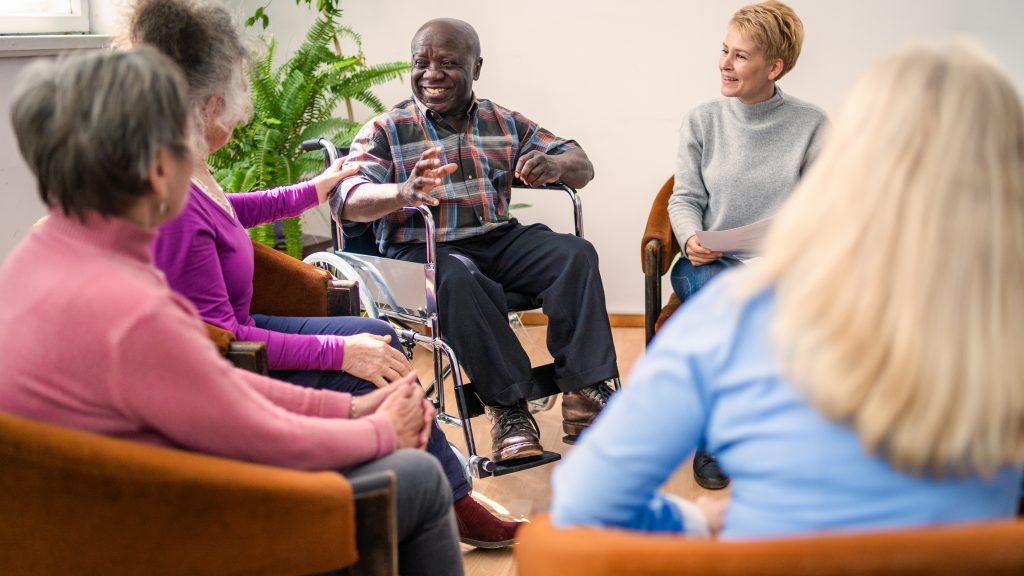Mental health tips for seniors

Mental health tips for seniors
Getting older comes with life changes, such as retiring, moving homes, or learning to manage a chronic illness. These events are significant and can impact your mental health.
However, being physically active, socially connected and challenging your brain can improve your long-term health. These risk factors along with a positive attitude toward aging and addressing mental health are key modifiable factors to reduce overall dementia burden by up to 35%.1 (Lancet, July 2017).
If you are feeling anxious or stressed, here are some ideas on how to take care of your mental well-being.
Get physical
Regular walks, yoga classes or ballroom dancing—whatever moves you, exercise and physical activity is good for both the mind and the body. Getting physical can boost your confidence and reduce the risk of falls.
In fact, low-impact exercises like stretching and strength training are actually necessary to help you stay healthy and reduce the risk of common age-related problems like bone fractures, joint pain, and other chronic illnesses.
In addition to the physical benefits, exercise can also help manage stress, anxiety, and depression.
Stay social
Meeting with family and friends makes you feel connected and can help reduce stress. Using social media, like FaceTime, Zoom or Skype are just some ways to stay in touch. If you’re not tech-savvy, don’t stress! Ask friends or family if they know anyone who would be willing to teach you how to use these different applications. Online tutorials are also helpful. Or, you can also keep it simple—writing letters or a phone call work just as well.
If you want to make new friends, volunteer. It’s a great way to meet new people and also give back to your community. You can volunteer in a million different ways: at museums or galleries; delivering meals on wheels; helping out at libraries, hospitals, or seniors’ centres are just a few.
If you’re looking for a charity, BoardMatch is a non-profit organization that matches individuals with volunteer board positions. Get involved with your favorite non-profit and become a board member.
Train your brain
Every time you learn a new skill, your brain thanks you for it. Now that you probably have extra time, try your hand at a new hobby. Whether it’s gardening, painting or cooking, new hobbies keep your brain fit and strong, and reduce stress and anxiety.
Resources
Keeping on top of your mental well-being can help you stay healthier, longer. Here are some other resources that can help.
211
A free and confidential service that can be accessed by phone, text, chat, and online for information on government and community-based, non-clinical health and social services. You can access it in any province or territory by dialing 211 on your phone or go to 211.ca to find your local service provider.
Canadian Counseling and Psychotherapy Association (CCPA)
Use the CCPA website to find certified counsellors/psychotherapists in your area. You can go for in-person counselling, or access online or tele-counselling.
When using their online search tool, you can search by specialization area. For instance, searching “seniors” will give you related options to choose from, such as Older adult/Aging issues and Geriatric counselling. You can also search by conditions, such as anxiety, or types of therapy, such as grief counselling.
Canadian Mental Health Association (CMHA)
CMHA is a community mental health organization available in more than 330 communities across every province and one territory.
Visit the CHMA website at cmha.ca to find information on mental health conditions and to find a CMHA branch in your area.
eMentalHealth.ca
eMentalHealth.ca is an online portal with information about mental health, including:
- A directory of mental health services and organizations
- Free online screening tools to help you determine if you has a mental health concern
- Info sheets on a variety of mental health conditions and topics.
Canadian Red Cross
The Canadian Red Cross offers support services for seniors who are living at home, including the Telephone Assurance Program which provides regularly scheduled friendly calls and safety checks. Visit the Canadian Red Cross website to find senior support services in your area.
Bayshore Home Health offers a wide range of home care services to help Canadians live independently for as long as possible. Contact us at 1-877-289-3997 for details.
Sources
1 https://ccsmh.ca/wellness-in-aging/
